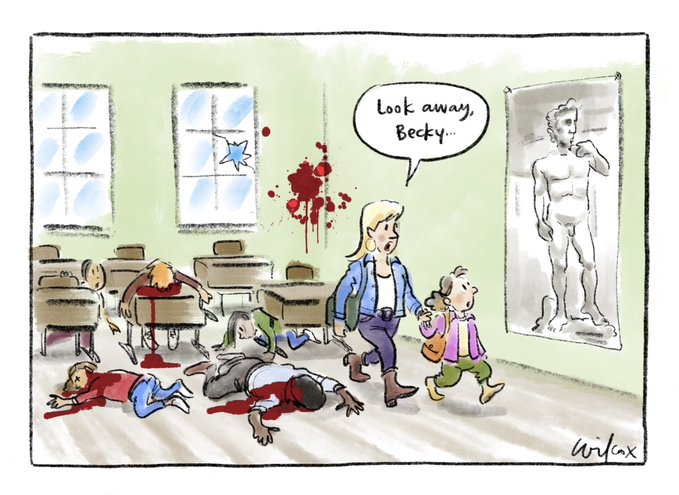Stare at flowers.
Not the snap-necked daffodils or the hyacinth your husband flattened with the car.
Take in the unblemished blossoms left.
Remind yourself that future thoughts
and prayers probably won’t be for your town
and if your town, not your kid’s school.
And if they are, statistically your child
would be scared but safe, hiding in a closet
under mops or climbing from a window, running
dazed toward the expressway to flag help.
I wish they would show the pictures of the dead

This is the news photo used to illustrate the mass killing of five in Texas. AP photo.
Yet another mass killing happened yesterday in Cleveland, Texas, when Francisco Oropeza, age 39, took his AR-15 style semiautomatic rifle and killed five people, including an 8-year-old child, after parents had complained Oropeza was keeping their baby awake at 11 p.m. shooting his rifle in his front yard. There have been more than 160 mass shootings in the U.S. this year, and this is the 19th shooting that killed more than four people, not including the shooter.
Nobody Knows His Name: A Note on Adam Scheffler’s “Heartworm” (& “Googling Myself”)
“Piss expressively.”
The onomatopoeic first line of Adam Scheffler’s poem, “Advice From a Dog,” hints at his virtuosity and his modesty. This guy ain’t too proud to pet and be petted. Another one of his openers make you wonder if he’s about to give himself too much credit: “She said my butt was a piece of art…” Not to worry:
…my greatest asset, if
you will, although come to think of
it she didn’t say it was good art
only a “piece” of it, as if it’s
not complete without her hands
on it…
Scheffler is careful about intimacies. I doubt he’ll ever go Lowell. There won’t be lines from a begging (or pegging) partner’s correspondence in his poems. Nor does this nice Jewish boy suffer from Maileria. He’s no wannabe macho.
Far Gone (A Levin Compaction)
The 1000 pp. Novel: (1960-70)
Verse VII
Stanza B
It was a far out bar Maxs Drop Dead Inn.
You know who drank there?
Men and Women
“Men and women are Images, hanging ghosts in the air, faces painted on the wall, masks no face can enter, the rules of a game getting explained over and over again to everyone and getting explained by getting played. They are images, but they are not immaterial (nothing is immaterial): they determine who produces what, who lives what life, who is punished for breaking what rules, who can be raped with impunity, who can be beaten with impunity, who can be killed with impunity.”
..One time, Xylea said, a client was supposed to go down on me and cum on my feet, but he kept trying to fuck me, and so I started going on a long rant about Aileen Wuornos (the lore of Aileen Wuornos, the litany of her crimes, crimes like a Dadaist poem, a poem written in the flesh about the goddess Medusa and about men and about the abyss) and then when he tried to stick his dick in me I stabbed him, and he looked up at me like what the fuck, and I was like why do you think I was telling you about Aileen fucking Wuornos, retard?
Democracy in the Streets (Saturday Night in Tel Aviv)
Tonight there were much more than 150 thousand demonstrating in Tel Aviv alone. If Tel Aviv has a population of about half a million, and over 150 thousand people were holding flags in the center of the city and shouting in union “democracy,” what does this mean? This is not just about certain rules being crammed down our necks every day, or about politicians who should be in jail. This is about the concept of democracy, and to my mind it should not be only an Israeli issue or even just an issue for Jews around the world. It is about the danger to democracy all over the world. My Hungarian friends, my Polish friends, my Italian friends, and my American friends all know the terrible threats to democracy being faced and the delicate freedom to protest that can disappear in a moment. Tell the world to pay attention to the freedom we have and guard it carefully!
Taking Bad Bunny Seriously

First, some facts about Bad Bunny, in case you think he’s a rowdy pet. He’s Billboard’s artist of the year and Spotify’s most-streamed artist for two years running—an amazing feat for someone who sings in Spanish. His reach is global, but his songs are local, rich with Puerto Rican slang. (I’ve heard him introduced as “Ba-Boney” on Spanish-language TV.) He looks like he was born in a baseball cap, but he sometimes performs in a dress. He chose his stage name because, as he told the late-night host James Cordon, “even when he’s bad, he’s cute.”
“Old Violin” & Hate Songs
Anger is an energy. Per Johnny Rotten and Richard Meltzer, though I couldn’t recall where/when Meltzer mused on animus in rock ‘n’ roll attitude so I asked him for a steer…
I’m sure—I know—I’ve said it…and things much like it…in lots of places over the years, but I couldn’t give you a GPS on it…it’s just in multiple creases and cracks in the rock-roll road.
I’m sure I’ve said, specifically, that SECOND-PERSON HOSTILITY is an omnipresent aspect of rock all the way back to its Delta Blues origins, much deeper than anything as benign as “attitude”: I dislike, detest, abhor YOU. Add gender hostility to the package (usually, but not always, as “misogyny”) and you got one throbbing heap of reliably functional HATESTUFF.
Anger isn’t quite the same…no…but…well…good luck in your search.
The Rose named Laetare

Dear Family and Friends,
Thilus just came back to us today, taking THREE MONTHS to get from Jacmel to Port au Prince.
He is 2 years old, his belly is tight like a drum and nearly bursting from an enormous and sick liver,
he has grey and flaking skin, he is weak and exhausted.
Jacmel is usually a FEW HOURS from Port au Prince by car. A little bit more by bus.
But not when your bus and everyone in it is KIDNAPPED crossing Martissant, on roads totally controlled by thieves,
and especially if there is no one on earth who can pay your ransom.
Twenty Years After
This piece, which Oliver Craner originally posted at his personal website last summer, offers a deep reading of Iraq’s post-invasion trajectory. Craner’s piece isn’t definitive. He gives a little too much credence to canny purveyors of the given such as journalist George Packer. Still, Craner’s account of Kanan Makiya’s journey beats what’s been on offer in most think pieces tuned to the 20th Anniversary of “shock and awe.” I commend, in particular, Cramer’s return to The Rope — Makiya’s own attempt to reckon with what happened in Iraq. The Rope, which refers to the one used to hang Saddam Hussein, tells the story of a Shiite militia-man whose life comes down to one sectarian betrayal after another. The anti-hero of the book — an orphan who looks up to his uncle as more than a mentor — will find out (before the book’s end) the uncle was behind the murder of the militia-man’s father. Iraq in a nutshell? It’s important to add, though, The Rope isn’t simply a fable. As Craner notes, Makiya’s fiction was founded on real events such as…
Levin Speaks of Rivers
on hearing dexter gordon
and the sam rivers trio
at zellerbach
Willie Pep: Knockaround Guy As Boxing Genius
Willie Pep got locked up a lot, mostly for gambling in the streets and driving too fast, which did nothing to dim the luster of his legendary boxing career. He was the people’s champ, and the people, too, gambled and went over the speed limit and got locked up.
Leave Me Alone
Pictures
..A series of drawings in a sketchbook. In the various pictures, Leila is drawn in blues and purples, while the girl she loves is drawn, usually, but not always, in reds and pinks. Sometimes the girl she loves looks a lot like Leila, but her (Leila’s) face is more angular, she’s a little taller, she’s got a femme fatale look to her while the girl she loves is more conventionally pretty, Leila has a heart tattoo on her right thigh while the girl she loves has a butterfly tattoo in the same place, Leila has big tits and the girl she loves has small tits, or medium-sized tits, usually they are both wearing a slutty little dress, both girls are haunted but Leila is undeniably more so. In the first few pictures, Leila is walking alone on the beach, smoking. In both pictures she’s smoking, actually, and in one she also holds a gun. Like some kind of femme Mersault, a thotty existentialist. She stares out at the horizon, and yet her gaze is rapt, as if she’s staring at nothing, or into the abyss. In these pictures, she is heartbreakingly alone, as if she’s arrived at the end of the world, like the girl in La Jetée.
Union
They’ll fire us after we’ve been
at the company a certain amount of time,
to bring in fresh employees who haven’t been
ground up yet, who haven’t been sliced up
and turned into meat with plastic covers
over us to feed to their customers yet,
who haven’t burned out yet, as if the job were
a kind of fire, and we were the kindling, or as if the job
were a kind of crop circle and we were the corn
that teenage aliens doodle their graffiti on for a purpose
that’s beyond us, for a purpose we are told
to believe in, and I too am angered by employees
who tend too slowly to my needs, who peer
mole-y eyed at me from stacks of paperwork at the
DMV, or who squeak mole-y voiced at me from
burrowing too long into the twisted tunnels of a phone,
angered at them for not being paid enough
to know English, or how to turn on my
cable, so I can watch rich beautiful people
with no problems fail to fix their personalities,
or watch an exposé on how people are
already hard at work doing nothing to fix
problems much bigger than mine, like wrestlers
paying for their own brain damage,
or a community developing cancer trying to
blow out their favorite flaming river,
but it’s easy to be bitter, and it’s hard to join
a union, to show up to the meetings,
sign your name to the list, stick your neck
far, far out from its shell, so others
will stick out their necks from their shells,
until we are a field of necks too numerous to
chop all at once without making a mess,
or until we are a field of throats blooming all the
same words at the same time, the way people
join together to pray—as if God were a
little deaf and can only hear us if we’re all
speaking at once, and a little nearsighted,
so he can only see us if we stand on each
other and form a human pyramid in the exact
shape of a person struggling to build a pyramid.
Wound Up Wrong
“What do you do?” asks the Russell Brandish/hipster-adman at a deadly L.A. party (full of workmates from a non-union shop). It’s this twit with a top hat’s follow-up question to the antihero of Emily the Criminal—played hard by Aubrey Plaza—who’d deflected his first prompt about her art-life. Emily/Aubrey gives it to him straight: “Credit-card fraud.” No doubt she’d’ve been better off quoting Jesus (the basis for my own once-and-future response to what-do-you-doers?): “Consider the lilies of the field, how they grow: they neither toil nor spin…” But Aubrey/Emily is no Lilly. (She’s no shrinking Violet either.)
The War Poets
It has been a year, a year of bombs and voices. These people speak through translators, these people speak their lives translated through war. This is the collective landscape, wrapped in the mist and myth of the moment, told in the fractured piecemeal that is war.

